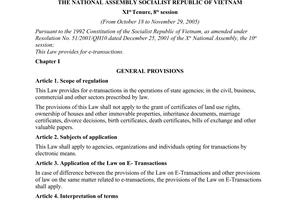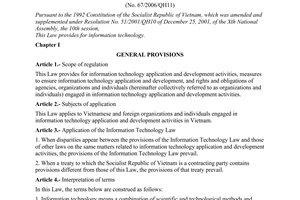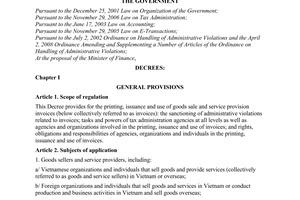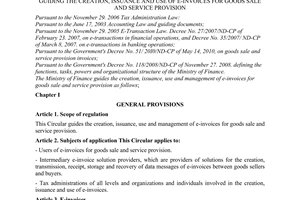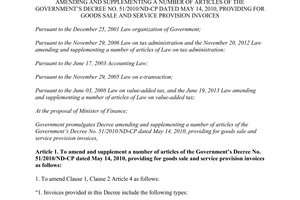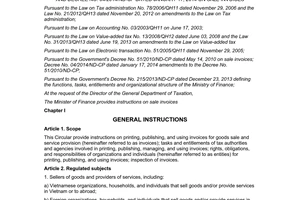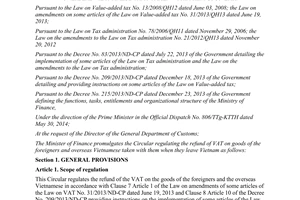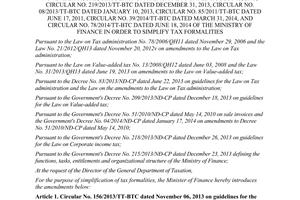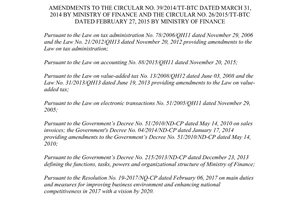Nội dung toàn văn Official Dispatch 4178/TCT-CS 2019 Guidance the Circular 68/2019/TT-BTC on electronic invoices
|
MINISTRY OF
FINANCE |
SOCIALIST
REPUBLIC OF VIETNAM |
|
No.: 4178/TCT-CS |
Hanoi, October 15, 2019 |
To: Departments of Taxation of provinces and central-affiliated cities
Pursuant to the Law on Tax administration dated November 29, 2006 and the Laws on amendments to the Law on Tax administration;
Pursuant to the Law on Value-added tax dated June 03, 2008 and the Laws on amendments to the Law on Value-added tax;
Pursuant to the Law on Accounting dated November 20, 2015;
Pursuant to the Law on Electronic transactions dated November 29, 2015;
Pursuant to the Law on Information technology dated June 29, 2006;
Pursuant to the Government's Decree No. 119/2018/ND-CP dated September 12, 2018 on electronic invoices;
On September 30, 2019, the Ministry of Finance has promulgated the Circular No. 68/2019/TT-BTC providing guidance on implementation of some Articles of the Government's Decree No. 119/2018/ND-CP dated September 12, 2018 on electronic invoices.
In order to facilitate the implementation and dissemination of the Circular, the General Department of Taxation hereby provides guidance on some contents of the Circular No. 68/2019/TT-BTC (detailed guidance is provided in the Appendix enclosed herewith).
Departments of Taxation of provinces and central-affiliated cities are requested to disseminate contents herein and provide training for enterprises, economic organizations, other organizations, household businesses and individual businesses within their provinces. Difficulties that arise during the implementation of this document should be reported to the General Department of Taxation for consideration./.
|
|
PP. GENERAL
DIRECTOR |
APPENDIX
GUIDANCE ON SOME
CONTENTS OF THE CIRCULAR NO. 68/2019/TT-BTC DATED SEPTEMBER 30, 2019 OF THE
MINISTRY OF FINANCE ON ELECTRONIC INVOICES
(Enclosed with the Official Dispatch No. 4178/TCT-CS dated October 15,
2019 of the General Department of Taxation)
1. Guidance on electronic invoices
a) Contents of electronic invoices: An electronic invoice shall have the same basic contents as those of a physical invoice as prescribed in the Circular No. 39/2014/TT-BTC of the Ministry of Finance and the following additional contents: the tax authority’s authentication code on authenticated invoices; fees and charges payable to state budget and other relevant contents (if any). With regard to invoice symbol and invoice code as prescribed in Clause 1 Article 3 of the Circular No. 68/2019/TT-BTC:
- Invoice code is a digit from 1 to 4 depending on the type of invoice such as VAT invoice, sales invoice, delivery note and other invoices, including electronic stamps, electronic tickets, electronic cards, electronic receipts and other electronic documents that have the prescribed contents of electronic invoices.
- Invoice symbol contains 6 characters, including letters and numerical digits indicating the following information:
+ The first character: C if the invoice bears a tax authority’s authentication code (hereinafter referred to as “authenticated invoice”); K if the invoice does not bear a tax authority’s authentication code (hereinafter referred to as “unauthenticated invoice”).
+ The next two characters, written in Arabic numerals, are the last two digits of the year in which the invoice is issued.
+ The next character is either T, D, L or M depending on the type of the invoice. To be specific: (i) T: electronic invoices registered with tax authorities by enterprises, organizations, household businesses and individual businesses; (ii) D: special electronic invoices that are registered by enterprises and organizations and do not have some mandatory contents of the “T” invoices; (iii) L: electronic invoices issued separately by tax authorities; (iv) M: electronic invoices generated by cash registers.
+ The last two characters shall be decided by the seller, or YY if not specified.
b) Buyer's and seller’s digital or electronic signatures:
In case the seller is an enterprises or organization, the seller’s digital signature on the invoice is the digital signature of such enterprise or organization; in case the seller is an individual, it will be the digital signature of the individual or another person authorized by the individual. In some special cases, electronic invoices do not necessarily have digital or electronic signature of the seller.
Electronic invoices do not necessarily have electronic signature of the buyer, except the case where the buyer is a business establishment and both the buyer and the seller agree to use digital or electronic signatures on the electronic invoice issued by the seller, digital or electronic signatures of the seller and the buyer must be added to the electronic invoice as agreed between two parties.
c) Issuance dates of electronic invoices: The issuance date of an electronic invoice shall be the date on which the digital or electronic signature is added to the invoice by the seller and shall be written in the day-month-year format and conform to the time when the electronic invoice is issued.
d) Other contents of electronic invoices: In addition to the abovementioned contents, enterprises, organizations, household businesses and individual businesses may add their logos, brands, trademarks or photos to the invoices.
VAT invoices used as tax refund claims shall comply with the Ministry of Finance’s Circular No. 72/2014/TT-BTC dated May 30, 2014 on refund of VAT on personal belongings carried by foreigners and Vietnamese people residing overseas upon their exit from Vietnam.
2. Exceptions
Pursuant to the Circular No. 68/2019/TT-BTC , electronic invoices do not necessarily have all the mandatory contents in the following 7 specific cases:
- Electronic invoice are issued by a supermarket or shopping mall to non-business buyers;
- Electronic invoices for sale of oil and gas are issued to non-business individuals;
- Electronic invoices are issued in the form of stamps, tickets or cards;
- Electronic air tickets are issued via websites and e-commerce systems to buyers that are non-business individuals following international practice and considered electronic invoices;
- Invoices are used in construction and installation; construction of houses for sale under installment plans;
- There are electronic delivery notes;
- Invoices are used for interline payment between airliners issued in accordance with regulations of the International Air Transport Association (IATA).
3. Electronic invoice format
- The electronic invoices shall be XML (eXtensible Markup Language) documents, which are meant to share electronic data between IT systems. The data of an electronic invoice consist of two components: information about the transaction and the digital signature (authenticated electronic invoices shall also contain the data of the tax authority code).
- The General Department of Taxation shall develop and announce the format of transaction-related information, signatures and tools for display of electronic invoices prescribed.
- The following requirements must be met when sellers directly transmit data to tax authorities:
i) Connect to the General Department of Taxation via a separate channel or MPLS VPN Layer 3, including 1 main channel and 1 backup channel. Each channel has a minimum bandwidth of 5 Mbps.
ii) Use an encrypted Web Service or Message Queue (MQ) for connection.
iii) Use Simple Object Access Protocol (SOAP) to compile, transmit and receive data.
4. Use of electronic invoices
The cases in which electronic invoices are used are specified in Article 12 of the Decree No. 119/2018/ND-CP .
When unauthenticated invoices are used, codes of business lines shall be level-4 codes according to the List of business lines enclosed with the Prime Minister’s Decision No. 27/2018/QD-TTg dated June 07, 2018.
5. Use of authenticated electronic invoices in cases of high tax risk
An enterprise posing high tax risk that means an enterprise having its equity below 15 billion VND and denoting one of 08 signs specified in Clause 3 Article 6 of the Circular No. 68/2019/TT-BTC shall use authenticated invoices for 12 consecutive months.
Supervisory tax authorities shall request enterprises and business organizations posing high tax risk to use authenticated electronic invoices (using the Form No. 07 enclosed with the Decree No. 119/2018/ND-CP). After 12 months, if the enterprise or business organization wishes to use unauthenticated electronic invoice and the tax authority finds that it is eligible to use unauthenticated electronic invoice, it may apply for permission to use unauthenticated electronic invoices in accordance with applicable regulations.
6. Use of authenticated electronic invoices to be provided separately
Clause 4 Article 6 of the Circular No. 68/2019/TT-BTC stipulates:
- Types of authenticated electronic invoices to be provided separately: sales invoices and VAT invoices.
- Four (04) cases where authenticated electronic invoices being sales invoices are provided separately.
-Two (02) cases where authenticated electronic invoices being VAT invoices are provided separately.
Enterprises, business organizations, other organizations, household businesses and individual businesses eligible for provision of separate authenticated invoices shall submit the application for provision of authenticated invoices to the tax authority and must fully declare and pay VAT, personal income tax, corporate income tax, other taxes and fees (if any) before their electronic invoices are authenticated by the tax authority.
7. Use of electronic invoices by exporters
Pursuant to Clause 5 Article 6 of the Circular No. 68/2019/TT-BTC , electronic VAT invoices or sales invoices shall be used in both cases of export and export entrustment. To be specific:
- When delivering goods to the border checkpoint or customs post where export procedures are followed, the exporter (including exporter processors) shall use the electronic delivery note as document for goods circulation. After the export procedures are completed, the exporter shall issue a VAT invoice or sales invoice for the exports.
- In case of export entrustment: When delivering the goods to the trustee, the trustor shall use the electronic delivery note. After the customs authority confirms that the goods have been exported in reality and the trustee has confirmed the quantity and value of goods exported in reality, the trustor shall issue an electronic invoice. The trustee shall provide the electronic invoice for the foreign buyer.
8. Suspension of use of authenticated electronic invoices and unauthenticated electronic invoices
Pursuant to Article 9 and Article 15 of the Circular No. 68/2019/TT-BTC , the use of authenticated electronic invoices and unauthenticated electronic invoices shall be suspended in the following cases:
- The cases specified in Point dd Clause 1 Article 15 of Decree No. 119/2018/ND-CP. To be specific:
+ An enterprise, business organization, other organization, household business or individual business has its TIN invalidated;
+ An enterprise, business organization, other organization, household business or individual business does not operate at the registered location as verified and announced by the tax authority;
+ An enterprise, business organization, other organization, household business or individual business has sent a notification of business suspension to a competent authority;
+ An enterprise, business organization, other organization, household business or individual business is banned from using electronic invoices by the tax authority for the purpose of enforcing payment of tax debts;
- Other cases specified in the Circular No. 68/2019/TT-BTC. To be specific:
+ Electronic invoices are used to sell smuggled goods, banned goods, counterfeits, goods violating intellectual property rights as detected and informed by competent authorities;
+ Electronic invoices are used for short selling of goods or services for fraudulent purposes as detected and informed by competent authorities;
+ A business registration authority or competent authority requests the enterprise to suspend operation in a conditional business line after find that the enterprise does not fully satisfy the conditions prescribed by laws.
An enterprise, business organization, other organization, household business or individual business that has suspended the use of electronic invoices is allowed to continue using authenticated electronic invoices or unauthenticated electronic invoices after it has informed the tax authority of its business resumption or has its TIN validated or decision on enforced payment of tax debts invalidated by the tax authority.
In case an enterprise, business organization, other organization, household business or individual business that has suspended its operation needs to provide electronic invoices for buyers to fulfill contracts signed before the tax authority suspends the business operation, authenticated electronic invoices shall be provided separately.
9. Processing erroneous authenticated/unauthenticated electronic invoices
Article 11 and Article 17 of the Circular No. 68/2019/TT-BTC stipulates that:
- If the erroneous authenticated electronic invoice is not yet sent to buyers, the seller shall send a notice of electronic invoice cancellation (Form No. 04 in the Appendix enclosed with the Decree No. 119/2018/ND-CP) to the tax authority and also send a replacing electronic invoice which bears the digital or electronic signature of the seller to the tax authority for authentication. The tax authority shall cancel the erroneous electronic invoice on its system.
- The erroneous authenticated or unauthenticated electronic invoice that has been sent to buyers shall be dealt with as follows:
+ If the name or address is wrong but the TIN and other information are correct, it is not required to re-issue the invoice;
+ If the information relating the TIN, amount, tax rate, tax amount or goods on the invoice is wrong, the seller and the buyer shall prepare a document specifying the errors, and the seller shall issue a new electronic invoice replacing the erroneous one.
- In case the tax authority discovers that an authenticated electronic invoice or an unauthenticated electronic invoice is erroneous, it shall send a notice to the seller for checking errors and provide the replacing electronic invoice (if necessary).
10. Transmission of unauthenticated electronic invoice data to tax authorities
Article 16 of the Circular No. 68/2019/TT-BTC provides guidance on method, time and form of transmission of unauthenticated electronic invoice data to tax authorities. To be specific:
a) Method for data transmission:
- The datasheet of electronic invoices (according to Appendix 2 enclosed with the Circular No. 68/2019/TT-BTC) shall be adopted in the following four (04) cases:
+ Service provision in the following fields: postal and telecommunications, insurance, finance and banking, air transport;
+ Sale of electricity, clean water if customers’ codes or TINs are available;
+ Sale of goods/services to individual buyers whose names and addresses are not required on the invoices;
+ In case of sale of oil and gas to non-business individuals, the seller shall compile data about every sales invoice issued to non-business individuals in the day on the datasheet of electronic invoices.
- The invoices that contain adequate information must be sent to tax authorities in case the seller is not required to transmit electronic invoice data in the form of datasheet of electronic invoices as mentioned above.
b) Time for data transmission
- A datasheet of electronic invoices must be sent to the tax authority together with the VAT return in accordance with the Law on Tax administration and its instructional documents.
- If the invoice that contains adequate information must be sent, the seller shall send it to the buyer and the tax authority at the same time.
c) Form of data transmission
- Direct transmission: Enterprises that satisfy the requirements as prescribed shall be allowed to make technical connection to transmit invoice data directly to tax authorities.
- Transmission via providers of electronic invoice-related services: Other enterprises shall sign contracts with providers of electronic invoice-related services, which will transmit their electronic invoice data to tax authorities.
11. Technical issues concerning authenticated electronic invoices
Article 12 of the Circular No. 68/2019/TT-BTC provides guidelines for dealing with technical issues in the following 3 cases:
- In case of technical issues of the tax authority’s authentication system, the General Department of Taxation shall utilize the backup system and make an announcement of such technical issues on its website.
- In case of technical issues of the system of electronic invoice-related service provider, the provider shall inform the sellers and request the General Department of Taxation for support. The service provider shall quickly repair the system and assist sellers in issuing electronic invoices and sending them to the tax authority for authentication as soon as possible.
- If the seller is unable to use authenticated electronic invoices because of technical issues, the seller shall inform the tax authority for assistance. While the issues are being fixed, the seller may use authenticated electronic invoices at the tax authority’s premises.
12. Development, management and use of electronic invoice information systems
The electronic invoice database developed by General Department of Taxation shall be compatible with the architecture of Vietnam’s Electronic Government. The General Department of Taxation shall process information and data before they are stored in the national database with the aim of ensuring rationality and uniformity. The General Department of Taxation shall assume responsibility to manage the electronic invoice information system.
13. Provision of electronic invoice-related services
Pursuant to the Decree No. 119, the Circular No. 68/2019/TT-BTC provides specific guidance on conditions for provision of electronic invoice-related services as follows:
Entity: To provide electronic invoice-related services, an organization must have been operating in the IT field for at least 05 years, have deployed IT applications and systems for at least 10 organizations, and have deployed electronic data exchange systems between branches of an enterprise or between organizations.
Finance: The organization that wants to provide electronic invoice-related services has obtained a guarantee of over 5 billion VND from a credit institution legally operating in Vietnam.
Personnel: There are at least 20 technicians having bachelor’s degrees in IT, including those who are experienced in network administration and database administration; Technicians are employed to monitor the electronic data exchange systems and support its users 24/7.
Technology: There are processes and equipment for backing up data at a backup center which is located at least 20 km away from the main data center.
Exchange of electronic invoice data with tax authorities must meet the following requirements:
+ Connect to tax authorities through a separate channel or through MPLS VPN Layer 3, which consists of 1 main channel and 2 backup channels. Each channel has a minimum bandwidth of 10 Mbps.
+ Use an encrypted Web Service or Message Queue (MQ) for connection.
+ Use SOAP to compile, transmit and receive data.
14. Effect
- The Circular No. 68/2019/TT-BTC dated September 30, 2019 of the Ministry of Finance comes into force from November 14, 2019.
- During the period from the effective date of the Circular No. 68/2019/TT-BTC to October 31, 2020, the following documents promulgated by the Ministry of Finance are still effective:
+ The Circular No. 32/2011/TT-BTC dated March 14, 2011 of the Ministry of Finance on generation, issuance and use of electronic invoices for sale of goods and services;
+ The Circular No. 191/2010/TT-BTC dated December 01, 2010 on management and use of transport invoices;
+ The Circular No. 39/2014/TT-BTC dated March 31, 2014 (amended by Circular No. 119/2014/TT-BTC dated August 25, 2014 and Circular No. 26/2015/TT-BTC dated February 27, 2015);
+ Decision No. 1209/QD-BTC dated June 23, 2015 of the Minister of Finance on pilot application of authenticated electronic invoices; Decision No. 526/QD-BTC dated April 16, 2018 of the Minister of Finance on expansion of the scope of pilot application of authenticated electronic invoices.
+ Decision No. 2660/QD-BTC dated December 14, 2016 of the Minister of Finance on extension of Decision No. 1209/QD-BTC dated June 23, 2015;
+ The Circular No. 37/2017/TT-BTC dated April 27, 2017 amending the Circular No. 39/2014/TT-BTC dated March 31, 2014 (as amended by the Circular No. 119/2014/TT-BTC dated August 25, 2014 and Circular No. 26/2015/TT-BTC dated February 27, 2015).
- From November 01, 2020, the Circulars and Decisions of the Ministry of Finance mentioned above shall cease to have effect.
- From November 01, 2020, enterprises, business organizations, other organizations, household businesses and individual businesses shall apply for use of electronic invoices in accordance with the Circular No. 68/2019/TT-BTC .
15. Transition
a) In case the enterprises, business organizations, other organizations, household businesses and individual businesses that use electronic invoices in accordance with the Decree No. 119/2018/ND-CP and the Circular No. 68/2019/TT-BTC discover errors in the invoices issued in accordance with the Government's Decree No. 51/2010/ND-CP , Decree No. 04/2014/ND-CP and their instructional documents issued by the Ministry of Finance:
- The seller and the buyer shall prepare a document specifying the errors, and send a notice (Form No. 04 enclosed with the Decree No. 119/2018/ND-CP) to the tax authority.
- The seller shall issue a new electronic invoice (authenticated or unauthenticated) to replace the erroneous one. The replacing invoice shall bear the text “Thay thế cho hóa đơn ký hiệu mẫu số, ký hiệu hóa đơn …số hóa đơn..., ngày... tháng... năm” (“This replaces invoice No. … dated … "). The seller shall add the digital or electronic signature on the replacing electronic invoice (in accordance with the Government's Decree No. 51/2010/ND-CP, Decree No. 04/2014/ND-CP and their instructional documents issued by the Ministry of Finance).
- The seller shall send the replacing electronic invoice to the tax authority for authentication (if the erroneous invoice is authenticated).
b) During the period from November 01, 2018 to October 31, 2020, if businesses are not capable of IT infrastructure to switch to use electronic invoices as requested by tax authorities in accordance with Decree No. 119/2018/ND-CP and the Circular No. 68/2019/TT-BTC and continue using invoices in the abovementioned forms, they shall send invoice data to tax authorities using Form No. 03 in the Appendix enclosed with this Decree together with submission of the VAT return. Tax authorities shall store invoice data provided by businesses in the invoice database and publish it on the website of the General Department of Taxation for searching purposes.
c) Public service providers (public schools, public health facilities) that have been using physical receipts may keep using physical receipts.
If a public service provider is requested by the tax authority to switch to use authenticated electronic invoice:
- If the public service provider (a public school or public health facility) does not have capable IT infrastructure to use authenticated electronic invoices and wishes to keep using physical receipts in accordance with Decree No. 51/2010/ND-CP dated May 14, 2010 and Decree No. 04/2014/ND-CP dated January 17, 2014, it shall send invoice data to the tax authority using Form No. 03 in the Appendix enclosed with this Decree together with submission of the VAT return.
- Public service providers (public schools, public health facilities) that have capable IT infrastructure shall apply for use of authenticated electronic invoices or unauthenticated electronic invoices in accordance with Article 8 and Article 13 of the Circular No. 68/2019/TT-BTC .
------------------------------------------------------------------------------------------------------
This translation is made by THƯ VIỆN PHÁP LUẬT and
for reference purposes only. Its copyright is owned by THƯ VIỆN PHÁP LUẬT
and protected under Clause 2, Article 14 of the Law on Intellectual Property.Your comments are always welcomed
